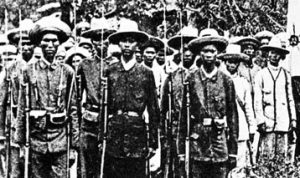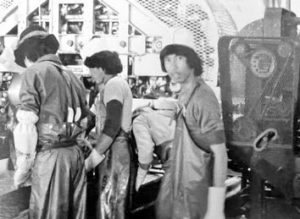Growing Protests Against Fascism in the Philippines here ♦ Learning from the History of Filipino Worker Activism here ♦

Filipino insurgents resisting US occupation after the 1898 Treaty of Paris
Growing Protests Against Fascism in the Philippines Create More Opportunities to Organize for Communism Worldwide
May 27—A new generation of Filipino youth, and their comrades around the world, is rising. They are outraged by the previous fascist Duterte regime and now, even more, by the election of Ferdinand (“Bongbong”) Marcos Jr. Many of their parents fought hard against the bloody and corrupt regime of Ferdinand Marcos Sr.
These ruling class families didn’t “re-emerge” as some report. They have always been there, unscathed by scandal and bolstered by capitalism and imperialism.
The Marcos Sr. fascist regime ruled from 1965 to 1986, supported by US imperialism. His Labor Export Policy sent Filipinos around the world to be super-exploited as low-cost labor. Twelve million Filipinos – about 10% of the population – are in this diaspora. Most are in the US, Saudi Arabia, Canada, the Emirates, and Japan.
Anti-imperialist rebellions have rocked the Philippines since the 1898 Treaty of Paris ended the Spanish-American war and handed control of the Philippines, Puerto Rico, and Guam to the U.S. There are long historical connections between struggles in Puerto Rico and the Philippines.
A fifty-year civil war that started early in the Marcos, Sr. regime still rages in the Philippine countryside. People say it has cost a million lives. Many of the rebels identify as communists.
Daniel, a young Filipino activist in Seattle (USA), met ICWP comrades who gave him a copy of Red Flag on May Day. He carved out time from work, family, and political commitments to meet with ICWP comrades. He “appreciated the emphasis on communism” in the Red Flag Seattle May Day report. He asked what the ICWP does internationally to advance communist revolution.
Daniel and others are particularly interested in recent developments in El Salvador. Duterte used gangs as an excuse to intensify oppression and broaden attacks on revolutionaries and even reformists, forcing many underground. The Filipino rulers label even religious people organizing schools for Indigenous children as “terrorists” and massacre them.
This is like how Bukele used gang violence as an excuse to institute a state of emergency in El Salvador and consolidate his power. He prohibited mass demonstrations and threatened to arrest those who participated in this year’s May Day rally and march—which happened anyway!
The rulers in both countries opportunistically ally with China or the US (or both) depending on which dynasty is in power and the conditions of inter-imperialist rivalry. Whoever is in power, brutal, life-threatening attacks on the working class and youth intensify.
Rely on the International Working Class, Not US Politicians
In Seattle, a broad coalition protested Marcos Jr. Some groups call for elections “free” of foreign intervention. Others focus on building revolutionary consciousness. One group emphasizes the revolutionary potential of Filipino society. Daniel and many others embrace a worldwide communist movement.
Activists have pressured a local congressman to introduce the Philippine Human Rights Act (PHRA). They hope to use it to prevent further US meddling in the Philippine military. The military has targeted Filipinos who are speaking out against the government and to attack the working class.
In 2018, the U.S. Congress passed a similar act to ban aid to the openly neo-Nazi Ukrainian Azov Battalion. Today, the Biden regime calls the Azov Battalion “heroes” and funnels millions to them.
We can never trust capitalist politicians. Relying on them promotes the illusion that workers and youth can pressure this system into providing a decent life for the masses. There is a long history proving this to be untrue.
The fight for communism needs more revolutionaries willing to struggle directly for communist ideas. Our strategy of mobilizing the masses directly for communism is attractive to many, including Daniel.
Relying on the international working class means we must reach more with our communist ideas and build communist relationships with them. Daniel wondered how many people read Red Flag. Thousands do now, electronically or in print.
We agreed that we must get it to many more friends in the US, the Philippines and around the world who would appreciate our bold promotion of communist politics.
We need to develop more international communist organizers for our international working class. Local meetings and social/political events and international zoom ICWP meetings all help.
Let’s cement relationships to advance our shared goal of international communist revolution. Let’s build the International Communist Workers’ Party everywhere!
We invite all Red Flag readers to help with these tasks, however you can and wherever you are.
Domingo and Viernes: Learning from the History of Filipino Worker Activism

Conditions in the fish house were wet, cold and dangerous
Silme Domingo and Gene Viernes were murdered inside the Seattle (USA) ILWU union hall on June 1, 1981. Both Filipino workers were only 29 years old.
Many of us who were living in the Seattle area remember that day with anger and tears. We had fought against racism and war in the 1960s and 70s, but we knew very little about the struggles of mostly Filipino and Asian workers in the Alaskan canneries.
Domingo and Viernes had met as teenagers, working summers in the canneries in Alaska, as their fathers had done. They experienced horrible conditions and racism. They worked 20-hour days with their hands and feet in icy water, cleaning and butchering salmon with long, sharp knives.
When they weren’t working, they stayed in unheated run-down barracks, eating rice and fish heads in segregated mess halls. White workers and managers stayed in single-room dormitories and ate a variety of foods including fruits and vegetables.
Back in Seattle, Domingo and Viernes saw that elders who had worked for years under these terrible conditions were in very poor health. Angered by this blatantly racist treatment, they went to the federal Equal Employment Opportunity Commission to file racial discrimination complaints against several Alaskan canneries. Several class-action lawsuits were filed also.
When the union that collected their dues, Local 37 ILWU, failed to support them, they formed the Alaska Cannery Workers Association. Both were then effectively banned from working in the canneries.
Supported by their co-workers, Domingo and Viernes became rank and file leaders in the union. They led a struggle to end the way members were traditionally dispatched to jobs through the union hall, where mostly the president’s cronies got the jobs. Street gangs who controlled gambling operations in the canneries bribed Local 37 to get their members jobs.
A few months later, Domingo and Viernes were shot down inside the union hall. But this wasn’t just a trade-union fight. It took years for their families to prove that President Marcos of the Philippines ordered their deaths, and that the corrupt union president and his gangsters carried out the murders.
Communists know that workers cannot win the world we need through unionism or reforms. We have learned this through many years of struggle.
Domingo and Viernes were not communists. But when they became involved with the KDP (Union of Democratic Filipinos) and the May First Movement, they started to recognize that capitalism was the real enemy. Both groups fought against Marcos’s regime and martial law in the Philippines.
Capitalism is why millions of workers all over the world are killed. Police and gangsters pull the trigger, but they are working for the bosses. To achieve justice for the working class, we must mobilize the masses to fight for communism. Telling the history of the international working class is essential to win young people to join the fight.
Most of the information here comes from Ron Chew, Remembering Silme Domingo and Gene Viernes: The Legacy of Filipino American Labor Activism (2012)


